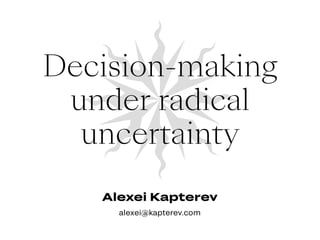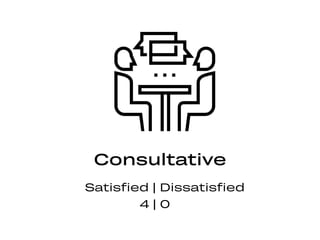Moral Decision-Making under Radical Uncertainty
- 2. All of my best decisions in business and in life have been made with heart, intuition, guts... not analysis. Je ff Bezos CEO Amazon
- 3. What about his worst decisions?
- 4. Intuitively Analytically Best 23 0 Worst ? ?
- 6. Decision styles ŌĆ© and outcomes: Analytical Intuitive r=+.11 r=ŌĆō.09 Phillips et al (2015)
- 8. Risk Uncertainty Quanti fi able Not quanti fi able
- 10. Uncertainty Importance Logic Calculations Narratives Divination Obvious Complicated Complex Chaotic
- 11. Uncertainty Importance Logic Calculations Narratives Divination Obvious Complicated Complex Chaotic
- 12. ? What might ŌĆ© individual narratives ŌĆ© about important ŌĆ© business decisions ŌĆ© reveal?
- 13. 14 Senior managers in IT, Biotech ŌĆ© and Fintech
- 14. Tell me about ŌĆ© an important ŌĆ© business decision ŌĆ© which already has ŌĆ© an outcome, either satisfactory or not
- 15. Organisational structure 10┬Ā% Private matters 16┬Ā% Hiring, firing, promotion 23┬Ā% Business strategy 23┬Ā% Investments 29┬Ā%
- 16. 43 Cases in total, ŌĆ© 29 ŌĆö┬Āpositive and ŌĆ© 14 ŌĆö┬Ānegative
- 17. 6 groups
- 18. 0 | 2 Hurt feelings Satisfied | Dissatisfied
- 19. We were so traumatised by the previous experience [they had to fi re the whole sales department] that we decided to outsource the sales process this time.
- 20. My objections to the merger werenŌĆÖt taken into the account, so I distanced myself from ŌĆ© the M&A process.
- 21. 6 | 0 Probing Satisfied | Dissatisfied
- 22. We were so scared by the previous experience that we decided to move really slowly with transformation.
- 23. 4 | 0 Consultative Satisfied | Dissatisfied
- 24. At some point my therapist told me: ŌĆśThis is your responsibility, nobody else is going to accept ŌĆ© the responsibility.ŌĆÖ
- 25. 4 | 1 Analytical Satisfied | Dissatisfied
- 26. I sat down and created a huge map with lots of options. Gradually, ŌĆ© I eliminated most of them.
- 27. 1 | 10 Idealisations Satisfied | Dissatisfied
- 28. I thought this was the only place in [country] where I can really study graphic design.
- 29. I thought they were amazing guys. And I still think they are great in their own way but I would have never expected this amount of irresponsibility and incompetence.
- 30. 15 | 0 Principled Satisfied | Dissatisfied
- 31. Everybody abandoned this guy [the startup founder] so surely ŌĆ© I must support him.
- 32. We won't become the [great] organisation we want to become with this [toxic] person on board.
- 33. Honesty is an asset.
- 35. What is the best way to make strategic business decisions under uncertainty, is it intuitive or rational?
- 36. Intuition
- 37. intuition Moral
- 39. Defining the problem Generating alternatives Coming to a decision
- 40. Defining the problem Identifying criteria Generating alternatives Coming to a decision
- 41. Is this a morally ŌĆ© good thing to do?
- 42. 1. DonŌĆÖt equate emotions with intuition, being a hostage to your emotions is not a good idea 2. Enthusiasm feels great, more balanced pros and cons create uncomfortable ambivalence but ultimately lead to better decisions 3. Moral compass is not a way to predict the future but morally virtuous decisions are seldom regretted 4. Discovering oneŌĆÖs moral compass seems like a reasonable thing to do To conclude:
- 43. Do what you must,┬Ā ŌĆ© come what may.┬Ā Balvdin IV King of Jerusalem



















![We were so traumatised by the
previous experience [they had to
fi
re the whole sales department]
that we decided to outsource the
sales process this time.](https://image.slidesharecdn.com/thesis-220706080625-5ec8d21f/85/Moral-Decision-Making-under-Radical-Uncertainty-19-320.jpg)








![I thought this was the only
place in [country] where I can
really study graphic design.](https://image.slidesharecdn.com/thesis-220706080625-5ec8d21f/85/Moral-Decision-Making-under-Radical-Uncertainty-28-320.jpg)


![Everybody abandoned this guy
[the startup founder] so surely
ŌĆ©
I must support him.](https://image.slidesharecdn.com/thesis-220706080625-5ec8d21f/85/Moral-Decision-Making-under-Radical-Uncertainty-31-320.jpg)
![We won't become the [great]
organisation we want to become
with this [toxic] person on board.](https://image.slidesharecdn.com/thesis-220706080625-5ec8d21f/85/Moral-Decision-Making-under-Radical-Uncertainty-32-320.jpg)











